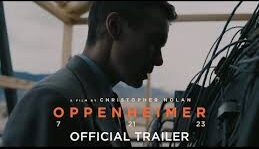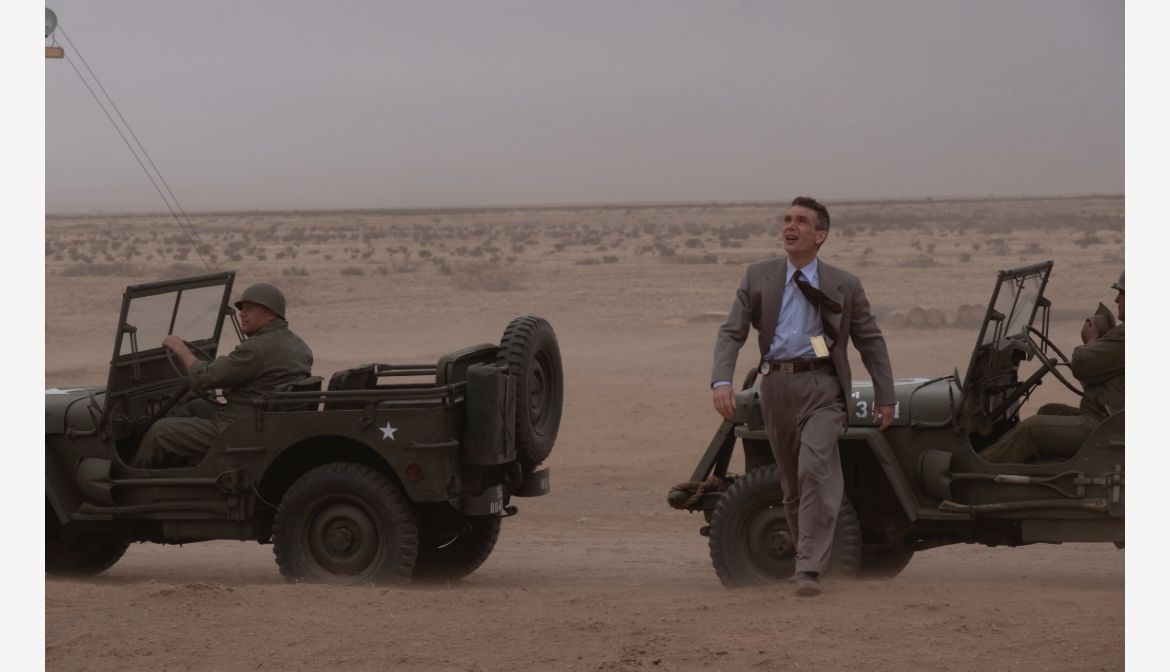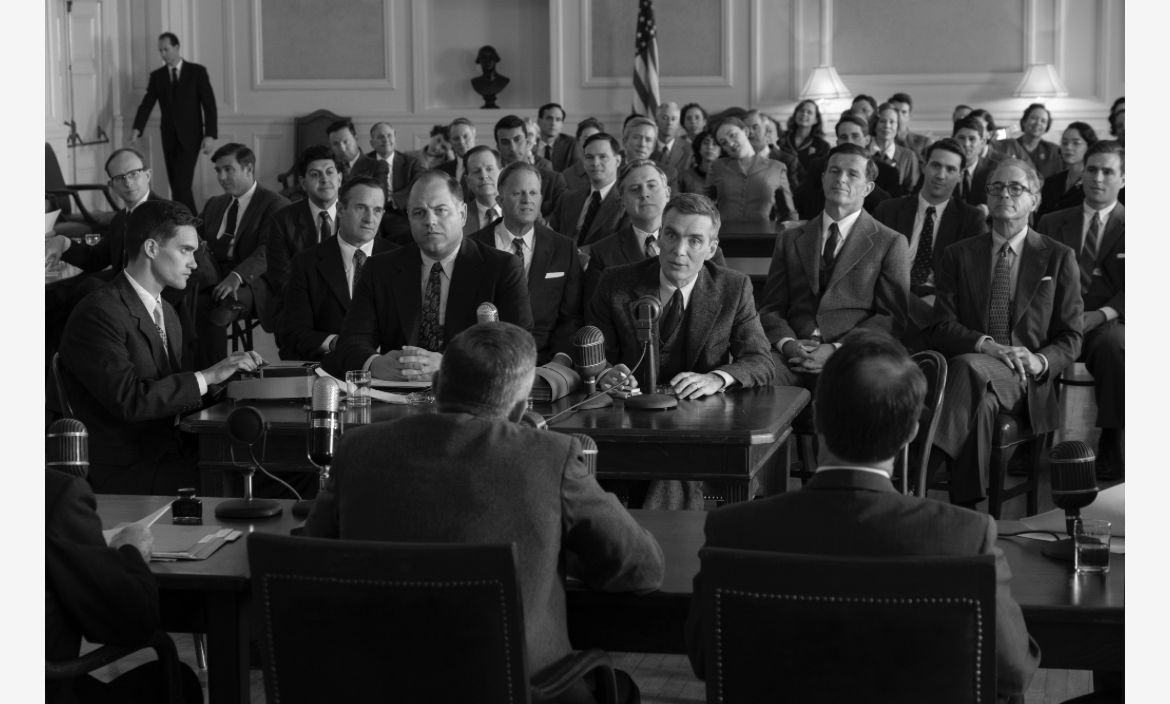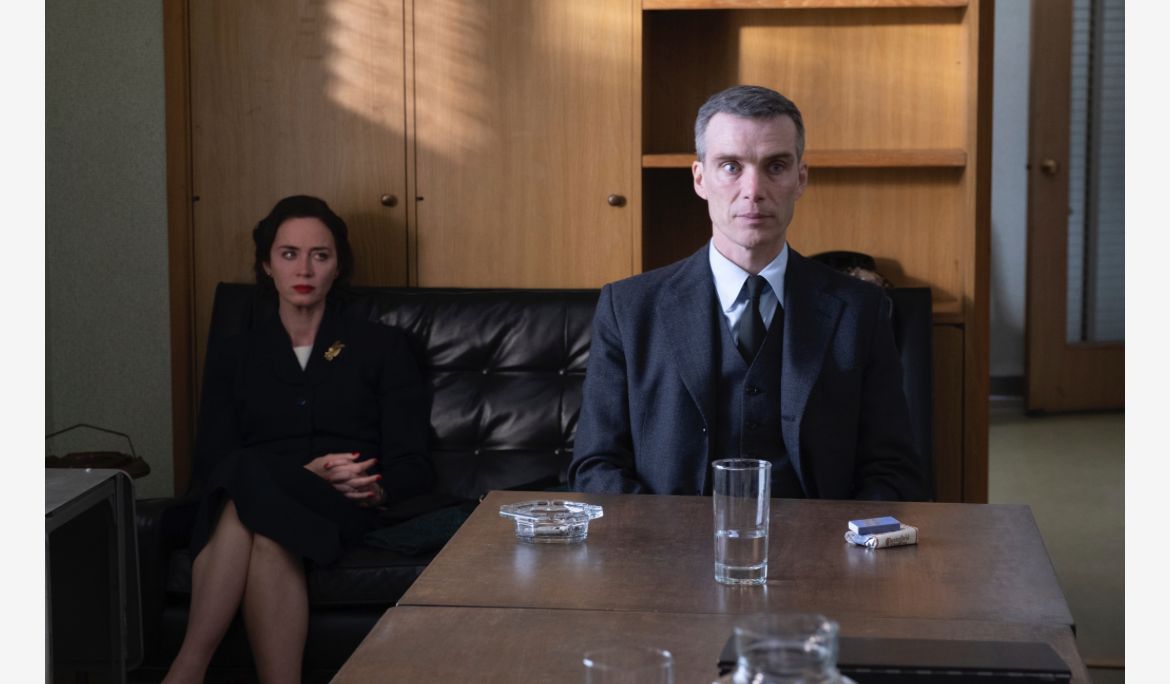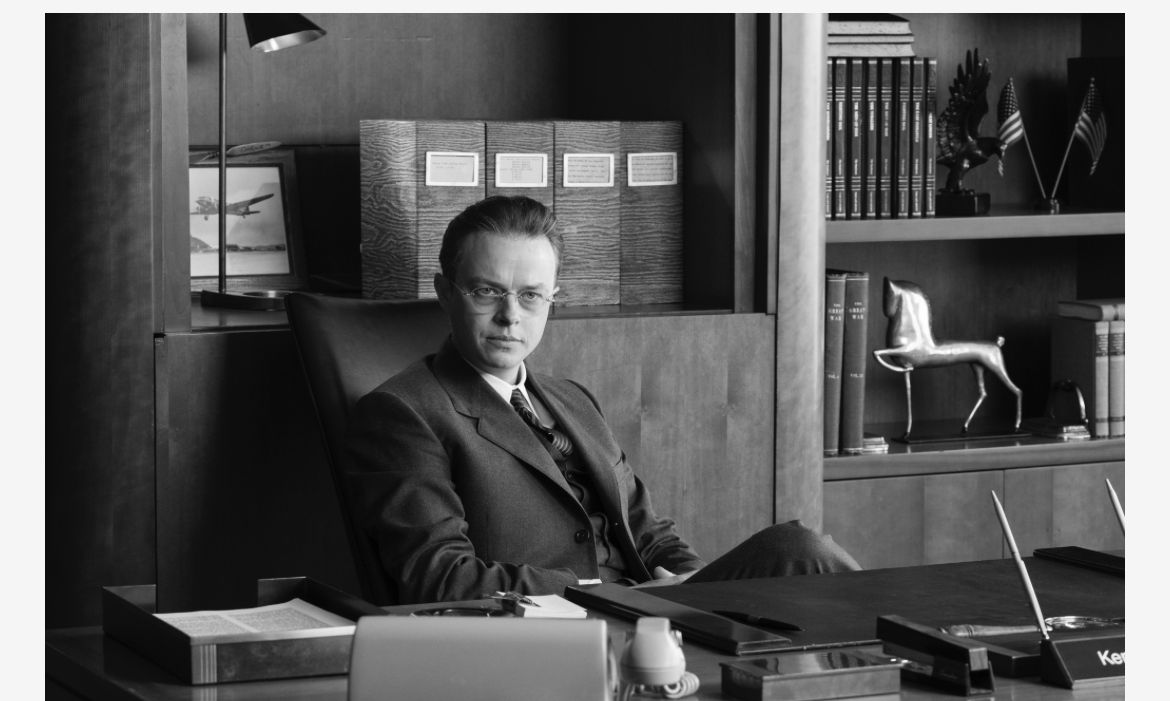OPPENHEIMER English Movie Review
Cast-;
Cillian Murphy , Emily Blunt , Matt Damon , Robert Downey Jr. , Florence Pugh , Josh Hartnett , Casey Affleck , Rami Malek , Kenneth Branagh , Benny Safdie , Jason Clarke , Dylan Arnold , Tom Conti , James D’Arcy , David Dastmalchian , Dane DeHaan , Alden Ehrenreich , Tony Goldwyn ., Jefferson Hall , David Krumholtz , Matthew Modine , Gustaf Skarsgård , Michael Angarano , Jack Quaid , Josh Peck , Olivia Thirlby , Christopher Denham
David Rysdahl , Louise Lombard , Harrison Gilbertson , Trond Fausa Aurvåg , Olli Haaskivi , Devon Bostick , Ma con Blair , Kurt Koehler , Josh Zuckerman , Alex Wolff , Guy Burnet , Emma Dumont , Jack Cutmore-Scott , Sco tt Grimes , Gary Oldman , Hap Lawrence , Harry Groener , Gregory Jbara , Tim DeKay , James Remar , Danny Deferrari , Máté Haumann , Matthias Schweighöfer , James Urbaniak , Rory Keanea and others .
Crew-;
Directer – Christopher Nolan , Screenplay – Christopher Nolan , Based on – American Prometheus by Kai Bird , M artin J. Sherwin , Producers – Emma Thomas , Charles Roven , Christopher Nolan , Cinematography – Hoyte van , Hoytema , Editer – Jennifer Lame , Music – Ludwig Göransson , Production companies – Syncopy Inc , Atlas Enter tainment , Distributer – Universal Pictures , Running time 180 minutes , Countries – United States , United Kingd om , Language – English , Budget – $100 million , R S V P – Pentagen PR R . S .Prakash .and Others.
In 1926, the 22-year-old doctoral student J. Robert Oppenheimer suffers from homesickness and anxiety while studying under experimental physicist Patrick Blackett at the Cavendish Laboratory in Cambridge. Upset with Blackett, Oppenheimer retaliates by leaving him a poisoned apple, then narrowly prevents visiting scientist Nie ls Bohr from eating it. Oppenheimer completes his physics PhD in Germany, and later meets theoretical physicist Werner Heisenberg at a conference in Switzerland. He returns to the United States, hoping to expand quantum physics research there, and begins teaching at the University of California, Berkeley and the California Institute of Technology; not long after, World War II breaks out in Europe. He meets his future wife, Katherine Puening, a biologist and ex-communist, and also has an intermittent affair with Jean Tatlock, a member of the Communist Party USA, until her suicide a few years later.
In 1942, U.S. Army General Leslie Groves recruits Oppenheimer to lead the Manhattan Project to develop an at omic bomb after Oppenheimer gives assurances he has no communist sympathies. Oppenheimer, who is Jewish, is particularly driven by the Nazis’ potentially completing their nuclear weapons program that Heisenberg hea ds. Oppenheimer assembles a scientific team including Edward Teller and Isidor Isaac Rabi in Los Alamos, New Mexico to secretly create the bomb. Oppenheimer collaborates with the scientists Enrico Fermi and David L. H ill, and he and Albert Einstein discuss how an atomic bomb risks triggering an unstoppable chain reaction that could destroy the world.
After Germany surrenders, several project scientists question the bomb’s continued importance, but Oppenhe imer stresses it will end the war in the Pacific. The Trinity test is successfully conducted just before the Potsdam Conference. President Harry S. Truman orders Hiroshima and Nagasaki to be bombed, forcing Japan’s surrender. Oppenheimer is thrust into the public eye as the “father of the atomic bomb” but the immense destruction and massive fatalities haunts him. He urges Truman to restrict further nuclear weapon development, but the preside nt rejects Oppenheimer’s advice, considering it weak.
As an advisor to the U.S. Atomic Energy Commission, Oppenheimer advocates against further nuclear research, especially the hydrogen bomb proposed by Teller. His stance becomes a point of contention amid the tense Cold War with the Soviet Union. AEC Chairman Lewis Strauss resents Oppenheimer for publicly dismissing his conce rns regarding the export of radioisotopes and for recommending arms talks with the Soviet Union. He also belie ves Oppenheimer turned Einstein against him.
At a hearing intended to eliminate his political influence, Oppenheimer is betrayed by Teller and other colleag u es. Strauss exploits Oppenheimer’s associations with communists such as Tatlock and Oppenheimer’s brother, Fr ank. Despite Rabi and several other allies testifying in Oppenheimer’s defense, Oppenheimer’s security cleara n ce is prematurely revoked, damaging his public image and neutralizing his policy influence. At Strauss’s later Sen ate confirmation hearing for Secretary of Commerce, Hill testifies about Strauss’s personal motives in engineer ing Oppenheimer’s downfall. The Senate votes against Strauss’s nomination.
In 1963, President Lyndon B. Johnson presents Oppenheimer with the Enrico Fermi Award as a gesture of politi cal rehabilitation. It is revealed that Oppenheimer and Einstein’s earlier conversation was not regarding Strauss, but the far-reaching implications of nuclear weapons; Oppenheimer believes he started a chain reaction that wi ll destroy the world.
Watch The Trailor-;
Movie Review-;
Christopher Nolan, known for his grandiose storytelling, brilliantly portrays the emotional journey of the father of the atomic bomb. He takes a fascinating approach, focusing not on the making of the A-bomb but on the life of its creator. Cillian Murphy gives an award-winning performance as Oppenheimer, skillfully portraying the compl exities of the physicist’s role. Robert Downey Jr. surprises the audience with his convincing portrayal of the nega tive character Louis Strauss, which showcases his versatility as an actor. Emily Blunt’s portrayal of Oppenheime r’s wife, Kitty, adds depth to the film, while Florence Pugh, Matt Damon, and the rest of the supporting cast enha nce the overall film experience.
The lack of CGI in depicting the A-bomb explosion at Los Alamos is a remarkable achievement by the entire tea m, resulting in one of the film’s most impressive scenes. The long 3-hour running time may bore some viewers, h owever those who are into the story will be fine with it.The film’s use of scattered timelines, an integral part of th e screenplay, will challenge viewers with limited knowledge of Oppenheimer’s life. Some prior understanding of the physicist’s background will enhance the viewing experience.The first hour is less dramatic than the second, a ffecting overall engagement. Additionally, the transition between monochrome and color displays may not appe al to all viewers.
A plethora of characters may confuse those unfamiliar with Oppenheimer’s story.Christopher Nolan’s direction perfectly chronicles the ups and downs of Oppenheimer’s career, expertly charting the theoretical physicist’s jo urney.The film impresses with excellent sound design and a score by Ludwig Goransson, which accentuates many of the scenes in the film. He delivers an award-winning result. The cinematography is excellent, while the editor could have tightened up the first half by removing some unnecessary scenes. The rich production values of the fil m are stunning, especially in depicting a nuclear explosion without CGI.In Oppenheimer, Christopher Nolan once again proves that he is a master at telling stories at his best.
Cillian Murphy’s performance is commendable and she will no doubt bag prestigious awards for her portrayal. However, scattered timelines and unnecessary visuals may confuse and bore some viewers. If you can ignore th ese features and focus on the plot, book tickets for the movie this weekend to experience Nolan’s magic.Altho ugh Nolan’s fans are happy that Nolan is going to make Oppenheimer, there are voices of protest in many parts of the world. America thought it was going to celebrate the atomic bomb it dropped on Hiroshima and Nagasak i.However, Oppenheimer has many scenes where he is upset that they did this, which is different from what Nol an showed in the film.
In particular, where Oppenheimer tells the President of the United States that his hands are bloody, the duplica te scenes of him taking out the cursive, Nolan shows the Americans for a second in the eye.Cillian Murphy didn’t play Oppenheimer, he lived it. Definitely a name on next year’s Oscar list. Especially the scene where he feels gui lty after dropping the atomic bomb, I feel the atom as music, the scene where he thinks the explosion of the ato mic bomb is like music is amazing.Similarly, our Iron Man, Robber Downey, is so intimidating that some people w onder if this is him.The majority of the film is dialogue, and a Nolan film has no shortage of action, but the film is almost entirely dialogue.
It is a question mark if even those who want action, action and fantasy will like this film.The film moves almost lik e a documentary, so you can only go if you have patience.The most interesting scene of the film is the scene whe re Oppenheimer meets Albert Einstein, especially the scene where he shows what Oppenheimer talked about in the climax, which makes it very clear what Nolan is trying to say. When Christopher Nolan announced a biopic, o f all things, I was intrigued. It’s like Hitchcock making a Fred Astaire musical. It’s like Spielberg making Death. It’s like Scorsese making a screwball comedy or western. Nothing says a filmmaker can’t change the pace, and befor e he became Christopher Nolan™, we had a great psychological thriller in Insomniac.
But now that he’s made his mark as one of the biggest filmmakers (with huge IMAX cameras as big as his reputat ion), what interest he might have in the nuances and intimacies of “ordinary life” remains. A Life of J Robert Opp enheimer, “Father of the Atomic Bomb”? Oppenheimer’s real subject, then, is not the life and times of its protag onist, but whether Nolan can penetrate the subatomic levels of the human psyche. In other words, did Oppenhe imer know more coming out than we did going in? The answer is yes and no. On a broad scale, yes, we see various forms of education that man imparts to himself. We see him interacting with people we only read about in physic s books: Einstein and Niels Bohr and Enrico Fermi.
We see his facility in learning languages: in the only cinematic instance where the Bhagavad Gita is used in the b edroom scene, he also studies Sanskrit. Although he did not officially join the Communist Party, we see his left is t leanings. We see him with a wife, a lover – both written very tragically. After the “victory” of Hiroshima and Nag asaki, we see Oppenheimer questioning his loyalty to America. What we don’t see is a different directorial visio n. Let me illustrate this with an amazing opening stretch from Interstellar, when the protagonist leaves his family to fly into space. It’s a very intense stretch, and you really feel the enormity of the emotion on the big IMAX scre en.
The sobbing daughter runs out, greeted only by the dust kicked up by her father’s speeding car. She can’t see him Later, we get another perspective shot from the side of the car – this time, clouds of dust obscure the father’s vie w of his home and his family. The collected, composed nature of the grandfather and brother contrasts with the emotional nature of the father and daughter. And we get one of Nolan’s most effective moments of play with his tearful father’s face. He juxtaposes the scene of the speeding car with the audio of the countdown – meaning the present and the immediate future – and… BOOM!The screen suddenly bursts into flames as the rocket ship takes off. I remember gasping and stuttering in the theater.
We see this kind of auteur-ial signature in Oppenheimer only during the Trinity test, the first time a nuclear devi ce was detonated. Nolan ratchets up the tension almost unbearably in the minutes before the test (there’s anoth er countdown clock here, a wonderfully analog version compared to the digital clock in Interstellar) — and when the bomb goes off, there’s silence. In a film full of religious allusions, this stretch is almost…sacred. Even if you’re not the religious type, I’ll bet you feel something when you look at the scary mushroom clouds. It is as if we are both playing God and witnessing God’s wrath. Silence is the only possible soundtrack. And then there’s a rumble of thunder, and…boom!The implication is unmistakable that humanity has been changed forever.
But the rest of the time, Oppenheimer is more obliging than dazzled, more admirable than awe-inspiring. The mo st surprising thing about the film is that it feels so much like other, earlier films. The early “he did this, then he did that” parts feel like any other biopic that skims the protagonist’s character and accomplishments. The larger tria ls feel like parts of The Godfather: Part II, where Michael Korolone is on trial. In the midst of this, Oppenheimer’s most important aspect never came. We are told of his guilt in creating this weapon of genocide, but we never fee l the weight of this guilt – because the film is always rushing to the next explanation, the next speech. (And belie ve me, there’s a lot of talk.) There’s no dwelling on any emotion. All the talking is outside, but what we really nee d to hear is Oppenheimer’s inner voice. Oppenheimer is definitely a watchable film. Matt Damon, Kenneth Bran agh, Robert Downey Jr., Emily Blunt, a wonderful Gary Oldman .
This IS MY Personal Review So Please Go And Watch The Movie In Theaters Only
Written By- T.H.PRASAD -B4U-Ratting – 5/5












